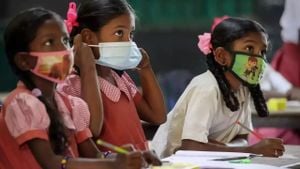Donald Trump has made headlines once again with his latest nomination for secretary of agriculture, appointing Brooke Rollins, a longtime ally, to the position. This announcement came during what many observers describe as a turbulent transition for Trump as he gears up for his second term.
Rollins isn't just another appointment; she has been entrenched in Trump's orbit for years. During the first Trump administration, she served as the acting director of the Domestic Policy Council and was also the director of the Office of American Innovation. After her stint at the White House, she co-founded the America First Policy Institute, a think tank closely aligned with Trump's agenda and composed of many former administration officials.
Trump's decision to select Rollins surprised some, particularly amid intense internal discussions within his transition team. Reports indicate there was significant controversy and infighting related to the secretary of agriculture role. According to sources, her appointment signals not just loyalty, but potentially reveals the challenges faced by his team as they navigated various interests within the agricultural community.
Setting aside her close ties to Trump, Rollins does have some educational background relevant to her new role. Raised on a farm in Texas, she holds a degree in agricultural development. Despite this, many industry veterans express concerns as she enters the role with less direct experience with agricultural policy than others who were also contenders for the position.
Immediate reactions to her nomination have created quite the dichotomy. Supporters from the MAGA wing of the Republican Party quickly rallied around her, including Sen. Rick Scott from Florida, who voiced confidence in her ability to fight for farmers and ranchers across the country. Likewise, Iowa's Republican Senators Chuck Grassley and Joni Ernst expressed supportive sentiments alongside fellow agricultural lawmakers such as Sen. John Boozman and Rep. G.T. Thompson.
On the flip side, progressive groups and some agricultural advocates voiced their concerns. Critics pointed out what they perceive as an alarming trend of selecting cabinet members based on loyalty rather than expertise. Karen Perry Stillerman, deputy director at the Union of Concerned Scientists, pronounced this nomination as part of the larger pattern whereby Trump rewards loyalty instead of prioritizing the needs of farmers and the broader agricultural sector, stating, “Our nation’s farmers, food workers, consumers and the public servants at the USDA deserve a secretary who knows and cares about the challenges they face.”
Meanwhile, the pressing issues awaiting Rollins reflect the current strife within agricultural policy, with lawmakers still negotiating extensions for the farm bill and scrambling to address the ramifications of government funding deadlines. One significant initiative continues to be discussions around the Supplemental Nutrition Assistance Program (SNAP), with potential restrictions being proposed on what can be purchased with benefits to encourage consumption of more nutrient-dense foods.
Brooke Rollins’s nomination adds another layer to the complex mosaic of Trump's cabinet decisions as he aims to assemble his team for the upcoming term, juxtaposed against challenging dynamics within both the party and the industry itself. While her confirmation seems likely due to her support among Republican leaders, many are left pondering how effectively she can navigate the multifaceted issues the USDA will face under her leadership.
The impact of Trump’s administration continues to be felt across various sectors, especially agriculture, where many stakeholders remain eager to see how Rollins will fair and what policies she will champion. For agriculture advocates, the coming weeks are poised to be decisive as they prepare for the new direction the USDA may take under Rollins. Agriculture has always been more than just policy; it’s about the livelihoods of farmers, which makes who leads the USDA particularly consequential.



